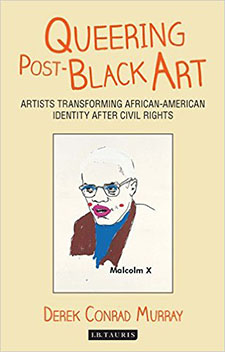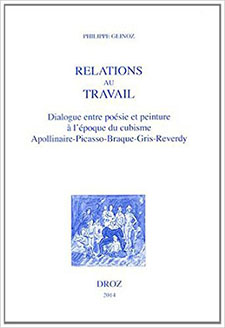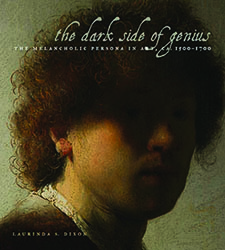CAA News Today
New in caa.reviews
posted by admin — March 03, 2017
 Michele Prettyman Beverly reads Queering Post-Black Art: Artists Transforming African-American Identity after Civil Rights by Derek Conrad Murray. The volume “amounts to the most comprehensive (and engaging) post-black theoretical methodology to date,” offering a new level of “critical rigor and innovative thinking” and “highlighting the intersection of black queer and sexual identities.” Read the full review at caa.reviews.
Michele Prettyman Beverly reads Queering Post-Black Art: Artists Transforming African-American Identity after Civil Rights by Derek Conrad Murray. The volume “amounts to the most comprehensive (and engaging) post-black theoretical methodology to date,” offering a new level of “critical rigor and innovative thinking” and “highlighting the intersection of black queer and sexual identities.” Read the full review at caa.reviews. Charles Palermo reviews Philippe Geinoz’s Relations au travail: Dialogue entre poésie et peinture à l’époque du cubism: Apollinaire-Picasso-Braque-Gris-Reverdy. Among the literary genre of these– or habilitation-turned books, it “is among the very best,” “filled with close readings, wide-ranging and thoughtful use of existing literature, and a framework of pertinent intellectual-historical context.” Read the full review at caa.reviews.
Charles Palermo reviews Philippe Geinoz’s Relations au travail: Dialogue entre poésie et peinture à l’époque du cubism: Apollinaire-Picasso-Braque-Gris-Reverdy. Among the literary genre of these– or habilitation-turned books, it “is among the very best,” “filled with close readings, wide-ranging and thoughtful use of existing literature, and a framework of pertinent intellectual-historical context.” Read the full review at caa.reviews. John Clark reviews Radicalism in the Wilderness: International Contemporaneity and 1960s Art in Japan by Reiko Tomii. This “impeccably researched and well-written contribution” offers a “challenge to art history” by “understanding the way in which modernisms from the periphery within a cultural continuum coordinate with international and transnational tendencies to constitute contemporaneity.” Read the full review at caa.reviews.
John Clark reviews Radicalism in the Wilderness: International Contemporaneity and 1960s Art in Japan by Reiko Tomii. This “impeccably researched and well-written contribution” offers a “challenge to art history” by “understanding the way in which modernisms from the periphery within a cultural continuum coordinate with international and transnational tendencies to constitute contemporaneity.” Read the full review at caa.reviews. Stephanie S. Dickey discusses Laurinda S. Dixon’s The Dark Side of Genius: The Melancholic Persona in Art, ca. 1500–1700. “Much more than an iconographic or visual survey,” the book “presents a solidly researched, interdisciplinary synthesis of early modern thinking about melancholia as a medical and cultural condition,” blending “medical, literary, and art-historical learning and lore.” Read the full review at caa.reviews.
Stephanie S. Dickey discusses Laurinda S. Dixon’s The Dark Side of Genius: The Melancholic Persona in Art, ca. 1500–1700. “Much more than an iconographic or visual survey,” the book “presents a solidly researched, interdisciplinary synthesis of early modern thinking about melancholia as a medical and cultural condition,” blending “medical, literary, and art-historical learning and lore.” Read the full review at caa.reviews.CAA Arts and Humanities Advocacy Toolkit
posted by admin — March 02, 2017
“The phone calls and emails began coming in a few weeks ago to the Nebraska congressional delegation — all Republicans, and all potentially crucial to an expected fight over the very existence of the National Endowments for the Arts and the Humanities under President Trump.” –“How to Block Trump Arts Cuts? Groups Look for G.O.P. Help,” The New York Times, February 28, 2017
Arts and Humanities Advocates are already taking action. CAA encourages its members and all advocates of the arts and humanities to be persistent and do more.
On January 23, 2017, CAA released a statement condemning the proposed budget cuts to the National Endowment for the Arts and the National Endowment for the Humanities, among other federal agencies.
“For more than a century, the College Art Association (CAA) has represented art historians, artists, museum professionals, designers, and others who think and care about the visual arts and its impact on our culture. We do this in part through direct advocacy for artistic and academic freedom.
Like many other Americans, we have closely watched the proposed changes to the federal government. Recent news reports reveal that the US President intends to propose the elimination of funding for the National Endowment for the Arts (NEA) and the National Endowment for the Humanities (NEH). This proposal is reportedly based in part on a recommendation by the Heritage Foundation that states, ‘As the U.S. Congress struggles to balance the federal budget and end the decades-long spiral of deficit spending, few programs seem more worthy of outright elimination than the National Endowment for the Arts.’
We offer our complete and total opposition to these efforts.”
The current administration’s proposal to cut funding for the NEA and NEH is based on a 1997 Heritage Foundation report, titled “Ten Good Reasons to Eliminate Funding for the National Endowment for the Arts.”
To support our statement, CAA has put together an Arts and Humanities Advocacy Tool Kit to help our members and anyone who wants to advocate for the arts and humanities. Information is power, after all. The Tool Kit information is pulled from a variety of sources that aid in forging partnerships, obtaining accurate data on the impact of the arts and humanities, and actions one can take in order to use your voice effectively.
We encourage you to contact us at CAA also. CAA staff will attend both Arts Advocacy Day and Humanities Advocacy Day. The more stories we can share as we meet with colleagues and representatives, the more influence we collectively bring to the table.
Locate and Call
Call your representatives about any and all pressing issues.
Find your local representative
This is a helpful guide on how to contact your local representative:
The How-to Guide to Contacting your Local Official
Face-to-Face
Face-to-face meetings with representatives are the most effective way to deliver your message. Hand your representative a physical document with facts and figures and be sure to explain who you are and how the group you represent relates to your local politician’s constituency.
Town Halls are one good way to voice your opinion to your local representative in person. The Federation for American Immigration Reform has a guide on how to attend Town Hall meetings.
You can also organize and request an appointment at the offices of your representative. The National Priorities Project has a good guide to setting up office appointments.
Sign Petitions
There are myriad petitions floating around these days, addressing vast numbers of topics. It can be hard to keep track or know which petitions to sign.
Change.org remains one of the best places to find a database of petitions by topic. The site also provides explanations and background information for each petition.
To sign the petition to support the NEA and NEH you can sign the White House created petition, the Change.org petition, and the Arts Action Fund petition.
Advocates can also send postcards directly to members of Congress that are customized with their artwork or other artworks, thanks to the #savethearts Postcard Project.
Arm Thyself with Data and Information
There is lots of good data about the impact of the arts and humanities on people and places. The National Humanities Alliance is working on several data gathering and mapping projects.
Americans for the Arts is also a hub for data and information about various federal arts agencies and arts education in America.
Data on the arts and humanities can also be found on the National Endowment for the Arts Facts & Figures page and the National Endowment for the Humanities Impact Reports.
This nifty website is a running tally of all the programs that the NEA funded in 2016.
You can also search the NEA website to see all grants they have awarded since 1996. Check to see what organizations in your local area are funded by the NEA.
The same search for grants can be done on the NEH website.
News from the Art and Academic Worlds
posted by Christopher Howard — March 01, 2017
Each week CAA News summarizes eight articles, published around the web, that CAA members may find interesting and useful in their professional and creative lives.
What NEA Supporters Can Learn from the Republicans Who Tried to Destroy It
How can we save the NEA? Since Republicans argue they are merely trimming the bloated federal budget, it is tempting to rely on the simple fact that eliminating the NEA will do little toward this goal. But this fiscal argument, while factually correct, won’t galvanize people to come out and support the agency. (Read more from Artsy.)
Why Small Grants from the Endangered NEA and NEH Matter
If quality of life and nourishment of intellect and spirit are as important to our national well-being as military might, then maintaining support for the arts is a no-brainer. Maybe the arts legions descending on Washington, DC, this month should try to seduce members of Congress with excerpts from performances and art displays that our tax dollars have helped to make possible. (Read more from CultureGrrl.)
Removal of Student Painting in Capital Leads to Federal Lawsuit
David Pulphus, a high school artist from Saint Louis, may never become a free-speech cause célèbre akin to Chris Ofili, the London artist who caused a furor in 1999. Still, Rep. William Lacy Clay from Missouri filed a federal lawsuit arguing that the removal of a work by Pulphus from the Cannon House Office Building in Washington, DC, violates the artist’s First Amendment rights. (Read more from the New York Times.)
Research Finds Career, Entrepreneurial Training Leads to Stronger Career Outcomes for Arts Graduates
Recent graduates with arts degrees have better career and entrepreneurial training than those who came before them, according to a report released by the Indiana University School of Education. The research, based on a survey of arts graduates, demonstrates that new approaches to arts education are helping prepare students for careers and give them tools they need to succeed. (Read more from the Strategic National Arts Alumni Project.)
Professors and Politics: What the Research Says
When Betsy DeVos accused liberal faculty members of forcing their views on students, she infuriated many professors and won praise from conservatives. Most faculty members who weighed in on social media denied the indoctrination and unfairness charges. While not disputing her assertion that they are more likely than others to be liberal, they said it was unfair to say that this meant they were indoctrinating anyone. (Read more from Inside Higher Ed.)
Appalachian Identities and Photography as Social Commentary
Most of my students in art history and art appreciation are first-generation college students, and many of them come from the economically depressed counties within a short driving distance of my institution, Morehead State University in eastern Kentucky. Through in-class discussion and office-hour chats, I have learned that many of them feel strong ties to an Appalachian identity. (Read more from Art History Teaching Resources.)
Bice Curiger on Why Parkett Is Closing
“Young kids think everything has to be free,” said the curator and publisher Bice Curiger in a recent phone interview, shortly after the announcement that Parkett—the hefty, finger-on-the-pulse German-English magazine she cofounded some ninety-nine issues ago—would cease publication. “How can you survive?” (Read more from Artnet News.)
Thinking about Open Access and Library Subscriptions
Is there good reason to expect that open access is likely to lead libraries and other customers to cancel their paid journal subscriptions? The context in which we have to ask this question is, quite frankly, one of dire economic straits in many academic libraries. Of course, libraries have been saying this for years, even decades. (Read more from the Scholarly Kitchen.)


